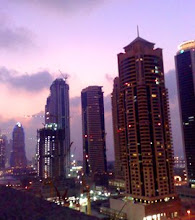| How can a manufacturer of soap powder, shampoo and skin creams be an agent for change in the Middle East's media industry? The answer, of course, is advertising spend. With newspapers, magazines, radio and (most) TV being distributed for free, media owners rely on advertising to generate revenue. Knowing this, the advertisers have the right to expect certain demands to be met. | |
| Understandably, such a situation is not popular among advertisers. It wastes their money and makes them complicit in potentially fraudulent transaction. The biggest advertisers in the Middle East have been working for years to change this. |
Monday, March 31, 2008
Flabby media dodges another bullet
Arab business doesn't need driven women...it needs them to drive themselves
| There has been plenty of jaw-jaw on how to get more Arab women into the work place, now there is chance hard cash will be thrown at the issue. The women's advisory panel of the Islamic Development Bank is meeting in Bahrain to discuss ways of spending a $10bn poverty-reduction fund. | |
In Saudi Arabia, where 58 per cent of University students are women, only around 9 percent of the women of the working age are available to work. As Arab News reports today, maybe the best to get women contributing to the economy is allowing them to drive. $10bn will buy a lot of Nissan Sunnys. |
Wednesday, March 26, 2008
An oversupply of F1 tracks
Bernie Ecclestone, boss of Formula 1, must love coming to the
Thursday, March 13, 2008
A crash felt around the world
Wednesday, March 12, 2008
UAE govt acts to stop locals emigrating
The UAE is considering a plan to provide citizens of the Gulf state with discounts on 14 food items, gasoline and cooking fuel to help offset inflation, the head of a consumer protection body said. Under the proposal, the ministry of social affairs will provide nationals with cards they can use at 16 co-operative supermarkets in the country to be eligible for the discounts.
A masterstroke. The UAE economy, up 7.4 per cent last year, would no doubt collapse without the hard work and innovation of UAE nationals, who make up around 10 per cent of the country’s working population. Any initiative that keeps talent in the UAE, and discourages locals from emigrating to, say,
Tuesday, March 11, 2008
Ugly fight for slice of the beautiful game
It’s hard to make sense of Dubai International Capital’s lengthy wrestle for control of Liverpool Football Club. The latest reports – and things seem to change on a daily, if not hourly basis – is that Tom Hicks, the club’s co-owner, has terminated all talks with DIC. Last week it looked as though DIC would settle for a 49 per cent share, leaving majority control with Hicks. Hicks was then angered after reading DIC only agreed to 49 per cent as a means to an eventual takeover.
Monday, March 10, 2008
YouTube as crap media-buster
Newspapers that write feel-good pap, TV stations that don’t touch domestic stories, radio stations that read the news off the BBC. It would be easy to live a year in the Middle East and barely know what was happening on your doorstep.
Much is made of the lack of press freedom in the region, but maybe it is more to do with the lack of journalistic creativity. Perhaps it’s best to leave news reporting to the amateurs?
Wajiha Huwaidar, a Saudi activist, marked this year's International Women's Day by defying a ban on women driving in the ultra-conservative kingdom and posted a video of her act on YouTube. The video doesn’t show much, just Wajiha pootling around some quiet country roads and talking to camera. It doesn’t need

